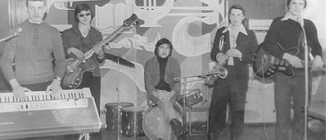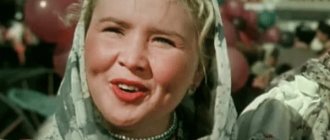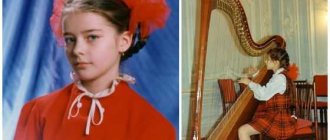Childhood and youth
Sergei Marin was born in the small village of Dubrovki, in the Penza region. In the family of the future actor there were no artists or people somehow connected with the world of art. Why a little boy from an early age cherished the dream of appearing in a movie is a mystery. But Sergei persistently pursued this, in the opinion of many, an unrealizable dream.
View this post on Instagram
A post shared by @kseniya_khorokhorina on Nov 3, 2020 at 7:54am PST
After graduating from school, Marin entered the cultural school closest to his home. But the chances of getting on the big screen after the Penza school were zero. The most a graduate could hope for was an appearance on the stage of a local theater, so Sergei, after studying for 2 years, went to Moscow.
The guy set his sights on VGIK and took this “height” the first time. He took a course with Professor Igor Yasulovich.
Childhood and youth: Dubrovki – Moscow
The family into which Sergei was born in December 1987 lived in the small village of Dubrovki, Spassky district, Penza region. The only famous person who came from Dubrovki was Colonel General Viktor Rodin, whose portrait hung in the local school, but Sergei had to change this injustice.
Actor Sergei Marin
The simple entertainment of a rural boy consisted of sledding and skiing in the winter, and swimming in nearby reservoirs and hiking in the forest in the summer. And watching TV movies on TV. It was then that Marin had a dream to become an actor.
Strong, internally collected and passionate about his dreams, after receiving his certificate, Serezha submitted documents to the Penza Cultural College. Now in the College of Arts the name of the famous graduate is pronounced with pride.
Young Sergei Marin during his student years
After two years of study, Marin made one of the most important decisions in his life - to enter VGIK. He managed to conquer the capital’s university on the first try and graduated with success in 2010, remembering for the rest of his life the instructions of his master, Professor Igor Yasulovich (“Are you from the Urals?”) that true talent is inner strength and honesty before yourself. Judging by the graduation performances in which Marin played Lyapkin-Tyapkin and Nikolai Ivanov, it was obvious that a brilliant future awaited this actor.
Sergey Marin on the stage of the theater
Personal life
The artist demonstrates integrity and a strong masculine foundation both in his work and in everyday life. The personal life of Sergei Marin is a taboo topic for discussion. The actor invariably ignores questions about this, believing that only Marin’s theatrical and film works can be discussed with strangers.
Posted by Serjio Marin Wednesday, August 3, 2016
Sergey Marin and Kira Egorochkina
Now it is not known for certain whether the artist is married. There is information on social networks that Marin has long been in a relationship with a girl named Tatyana. The probable wife of the actor comes from Sergei’s native village. Perhaps they are still together today, but the details of family life are unknown to the press. The actor does not report his personal preferences even from his personal Instagram page. There he appears in photographs dedicated to his creative activities.
Advice for aspiring startups
To achieve the desired result, it is extremely important to choose the right management . Marina says that their team abandoned many interesting ideas halfway through, since they did not have the desired infrastructure, but they plan to return to them. If an established company is growing rapidly and its founders are unable to reinvest, then there is no point in chasing venture stories.
The thing is that this process takes a lot of money and time. You need to focus on promoting the company and increasing capital. You should go to accelerators only if there is a need to quickly promote your business, but there are not enough funds for this.
To achieve the desired results, Marina recommends studying a book by Tim Ferriss called “The Four-Hour Workweek.” In America, all businessmen are actively discussing this work of the famous author. The book contains effective advice. For example, during the week a person makes a lot of calls and meetings.
In order to save time and achieve results, you need to reschedule all important tasks so that they can be dealt with in two days with breaks of 20 minutes. This time is enough to give the body a rest and avoid stress. The entire book contains a large number of useful tips that will increase the efficiency of your work week several times over.
Opening a professional office
At one time, Marina, together with her classmate, opened a company with 16,000 rubles and shared their achievement with close friends and family. Their first client was their classmate, who asked to organize a trip for her abroad. The guys invested all their savings in their business. For 8 thousand they rented a table in a huge office in a multi-story building in St. Petersburg. This move was made specifically so that clients would perceive the picture presented in front of them as a single office.
Applications appeared immediately, as people sent their children to England for 100-200 thousand rubles. Money was always brought in cash, which is why everything had to look serious and professional. The website for the company was created by hired workers. It took six months to find a professional developer, but it was worth it.
The result of the efforts made
Dmitry Pistolyako and Marina Mogilko, graduates of the Faculty of Economics of St. Petersburg State University, managed to launch their first service LinguaTrip in 2015, and a year later their business turnover amounted to $5 million. At the core of their business is that they source suitable courses from international language schools. Clients can also book accommodation close to their place of study. Marina and Dmitry came to the attention of the American media, which write about talented young entrepreneurs. The rapid career rise of this business was preceded by years of offline work.
The 500 Startups Foundation allocated $100 thousand for the development of Marina and Dmitry’s company, so they began scaling their business. Now their clients have access to training in ten languages in 300 of the most popular schools in the world. The average cost of accommodation for one program participant is 1.5 thousand dollars. Entrepreneurs get acquainted with foreign language schools at thematic international exhibitions. LinguaTrip offices are located in two countries where qualified managers provide customer service:
- Russia.
- USA.
The project team includes four people: in addition to Marina and Dmitry, there is also Dmitry Kravchuk, as well as Daria Starikova. Now the talented girl is married, thanks to which she is engaged not only in her business, but also in her family. She plans to give birth to two children, who will definitely inherit all the talents of their star parents.
Theater and films
Already at Sergei Marin’s graduation performances, it became clear to everyone that the artist had achieved success and had brilliant prospects ahead of him. It is noteworthy that the roles in these productions went to Sergei that were quite diverse and complex.
For example, in the play “E!” based on “The Inspector General” by Nikolai Gogol, Marin played Lyapkin-Tyapkin. And in “Ivanov,” based on the play of the same name by Anton Chekhov, the audience saw Marin in the image of the nobleman Nikolai Ivanov, a complex, reflective and restless man.
View this post on Instagram
A post shared by Sergey Marin (@marin_official_fan_club) on May 22, 2020 at 10:36am PDT
A cinematic biography of Sergei Marin started immediately after graduation, in 2010. The debut role of the 23-year-old artist hit the top ten, as they say. Sergei appeared as the biker Flame in Ilya Khotinenko’s acclaimed film “Bikers.”
It is noteworthy that the young actor made his film debut in the leading role. This romantic story of modern Romeo and Juliet caused mixed reviews from viewers, but the film was seen by thousands of melodrama lovers.
View this post on Instagram
A post shared by Sergey Marin (@marin_official_fan_club) on Jul 20, 2020 at 9:09am PDT
Sergei Marin in the film “The Murderers”
Marin was extremely lucky. The following year, after the film “Biker,” director Sergei Ginzburg offered him a role in the series “The Life and Adventures of Mishka Yaponchik,” beloved by millions of viewers. Marin appeared in the guise of criminal investigation inspector Osip Tor, or Osya. It was a success.
Sergei woke up famous after the film was released. The actor's character Osya, noble, deeply decent, beautiful and proud, instantly captivated the hearts of the audience. The impeccable performance of the artist, very young and just beginning his own creative path, was noted by both spectators and critics.
In Sergei Marin’s 2012-2013 portfolio, the most popular are the leading roles in the series “Tariff on the Past”, “Give Me a Little Warmth”, “Snipers: Love at Gunpoint” and “Without a Statute of Limitations”.
View this post on Instagram
A post shared by Sergey Marin (@marin_official_fan_club) on Jul 20, 2020 at 12:04am PDT
Sergey Marin and Sergey Chirkov
2014 broke all records - Sergey Marin appeared in six projects at once, in most of them in the central roles. The melodramas “Happy Chance”, “Clean Water at the Source”, “I’m Not Afraid Anymore” and “Healing” were watched with pleasure by millions of television viewers.
The greatest success was the series “Orca,” where Marin played Captain Kirill Cherepanov. Thanks to his athletic figure (with a height of 183 cm, Marin’s weight is 75 kg) and charisma, the actor brilliantly coped with the role. The melodrama “Half a Kingdom for Love,” in which Marin appeared together with Yulia Parshuta, also aroused considerable interest among the public.
In 2020, the melodramatic film “The Past Can Wait” by Igor Nurislamov was released, where, in addition to Marin, Tatyana Arntgolts, Sergei Peregudov, Svetlana Smirnova and other popular artists whose names have long been familiar to film lovers starred.
View this post on Instagram
A post shared by Sergey Chirkov (@chirkov.sergey.official) on May 17, 2020 at 9:59am PDT
Sergey Marin, Sergey Chirkov and Sofya Sinitsyna
At the end of March 2020, fans of Sergey Marin’s talent received a new gift from their favorite artist: the 4-episode film “Casanova’s Earring” by Denis Eleonsky was received with delight by melodrama lovers.
Also this year, the actor played the main role in the detective melodrama “Hotel of Last Hope,” an adaptation of Tatyana Ustinova’s novel.
At the beginning of 2020, the actor played the role of Count Grigory Grigorievich Orlov in the drama “Ekaterina. Takeoff,” a continuation of the dramatic series about the life and development of Catherine the Great as a ruler.
View this post on Instagram
A post shared by SERGEY MARIN | FilmActor | (@kinoakter_sergey_marin) on Jan 7, 2020 at 11:09am PST
The hero Marina has a tough temperament. Orlov’s temper was the reason for the cooling of the empress’s feelings towards him. Sergei’s partner in the project was Marina Alexandrova. The performer called his role a gift that any actor dreams of.
The first film told about the ruler's youth and how the Princess of Anhalt-Zerbst turned into the autocratic ruler of the Russian Empire. "Catherine. Rise" focuses on the 6th year of the Empress's reign and talks about the new challenges she faced: the threat of war, a weaving anti-government conspiracy, the intrigues of her favorites.
A bright page in the actor’s filmography is considered to be the war drama “The Balkan Frontier”, in which Marin appeared in one of the main roles. In 2020, the artist also played the role of a GRU captain in the film “Badaber Fortress.”
Marin Dmitry Alexandrovich, actor
Dmitry Aleksandrovich Marin was born on January 22, 1984.
- He first appeared on stage as a child, when he studied at the Pskov Pedagogical Complex (arts department, theater and choir class) - Dmitry performed a one-man show “The Tale of the Golden Cockerel” by A.S. Pushkin.
- In 1999-2001 he collaborated with the Pskov Municipal Youth Theater "Benefit", where he performed the roles of Steve (A Streetcar Named Desire by T. Williams) and Mercutio (Romeo and Juliet by W. Shakespeare).
- In 2000, Dmitry entered VTU named after. M.S. Shchepkin (course of V.M. Beilis and V.N. Ivanov). Even during his studies, he established himself as a performer whose talent is not tied to any specific role, playing both dramatic and poignant roles with equal success. Dmitry Marin's first great success was his work in performances based on the works of F.M. Dostoevsky - Smerdyakov in The Brothers Karamazov and Raskolnikov in Crime and Punishment. These roles, filled with subtle psychological authenticity, made it possible to talk about the sophomore Marin as an artist who can handle a serious repertoire. Each of Dmitry’s student works is worthy of special mention - he played in performances based on domestic and foreign classics (Tikhon in “The Thunderstorm” by A.N. Ostrovsky, Rudy Panko and the Devil in “Wonderful Night...” based on “The Night Before Christmas” by N.V. Gogol; Milorad Tsvievich in “Doctor of Philosophy” by B. Nushich), in productions based on the works of Soviet authors (Procopius (“Vanya, how are you here?” by V. Shukshina), Silva in “The Elder Son” by A. Vampilov).
- In 2005, Dmitry Marin was accepted into the troupe of the State Academic Maly Theater. The young artist is immediately actively included in the current repertoire - he is introduced to the roles of the Passerby in “The Cherry Orchard” by A.P. Chekhov, the Unknown in “No Day to Day” by A.N. Ostrovsky and Prince Claus in “The Snow Queen” by E. Schwartz.
- Dmitry Marin has been serving at the Maly Theater for exactly 10 years. Over the years, he has proven himself to be one of the most gifted young artists in the troupe. Marina is distinguished by her bright individuality, organic nature, rich stage temperament, and plasticity. Dmitry's creative palette is very rich, which allows him to try his hand at a wide variety of genres with equal success, from children's fairy tales to tragedy, from comedy to musical drama. Among the roles played by Dmitry Marin are Vanichka (“The Death of Tarelkin” by A.V. Sukhovo-Kobylin), Rode and Fedotik (“Three Sisters” by A.P. Chekhov), Cat Scientist (“The Tale of Tsar Saltan” by A.S. Pushkin ), Longueville (“Labour of Love…” by W. Shakespeare), Bertoldo (“Mad, Mad Henry” by L. Pirandello), Tsar (“Smart Things” by S.Ya. Marshak), Apollo Murzavetsky (“Wolves and Sheep” by A. N. Ostrovsky), Krasavin (“Children of Vanyushin” by S.A. Naidenov), Epikhodov (“The Cherry Orchard” by A.P. Chekhov), Nikandr Mukhoyarov (“Truth is good, but happiness is better” by A.N. Ostrovsky), Fiscal (“Don Juan” by A.K. Tolstoy), Khlestakov (“The Inspector General” by N.V. Gogol) and a number of others.
- An outstanding event in the artist’s creative biography was the performance of the role of the petty official Karandyshev in the drama “Dowry” by A.N. Ostrovsky. “Karandyshev-Marin is not a tragic hero, but not pathetic, much less vile, just a modest little man who dared to jump above his head... Karandyshev in this “Dowry” is a small but significant transition from Ostrovsky to Dostoevsky with his “meek” rebels “,” noted theater critic Vyacheslav Shadronov.
- Marin’s next significant work was precisely Dostoevsky’s hero - the lackey-rhyme-weaver Vidoplyasov, whose poetic “Screams” add even more phantasmagoric quality to “The Village of Stepanchikovo and its Inhabitants.” Angular, twitching like a clown on strings, Vidoplyasov “basks” in his own insignificance, without, however, forgetting to dream of future greatness. This character, scary and funny at the same time, became one of the notable successes of the performance.
- The artist’s most recent role was that of the great French comedian Moliere (“The Youth of Louis XIV” by A. Dumas the Father). In this performance, the hero is just entering the field of drama and court intrigue. However, Moliere, played by Dmitry Marin, appears as a wise man beyond his years, whose advice helps shape the personality of the young monarch, the future Sun King.
Filmography:
- “The Legend of Koshchei”, “Papa”. Among the series with Dmitry’s participation are “My Love”, “Annushka”, “Rook”, “Precinct”, “Alien Wings”, “Univer”, “Moscow. Three Stations”, “Secrets of the Institute of Noble Maidens”, “Guardian of the Law”, “Construction”, “Philology Faculty”, etc.
Thursday, July 14, 2020 12:21 pm.
.
Permalink
Reply Subscribe
Sergey Marin now
In 2020, Marin pleased fans with his next appearance in the historical drama “Godunov”, playing the role of Dolgoruky, and in the continuation of the beloved series “Ekaterina. Imposters."
View this post on Instagram
A post shared by SERGEY MARIN | FilmActor | (@kinoakter_sergey_marin) on Dec 9, 2020 at 10:36am PST
Sergey Marin in the film “Cathedral”
In the news about the latest projects in which Marin participates, several names flash. The artist is working on a role in the historical film “Cathedral,” which is being filmed in the Pskov region. According to the plot of the film, the hero Sergei is a serf, whose beloved Princess Maria (Svetlana Ivanova) becomes.
In 2019, the detective story “The Murderers” was being prepared for release, where Sergei’s partners on the set were Zoya Berber, Sergei Chirkov, and Sofia Sinitsyna.
Biography
Dmitry Zinovievich Temkin (Dimitri Tiomkin) was born in the city of Kremenchug in 1894 or, possibly, in 1899 (as indicated in his passport). His mother, Maria Temkina (nee Tartakovskaya), taught music, his father was a doctor. He studied piano at the St. Petersburg Conservatory with Felix Blumenfeld and Isabella Vengerova, and in the composition, harmony and counterpoint class of Alexander Glazunov, and in his free time he often spent time in “Stray Dog”, communicating with another talented conservatory student Sergei Prokofiev and dancer Mikhail Fokin.
Dmitry Temkin photography
Tiomkin earned his living by accompanying the ballerina Tamara Karsavina and improvising during the performances of comedian Max Linder.
Dmitry Tiomkin's professional debut in the field of film music took place in the cinemas of St. Petersburg, where he was a performer, accompanying silent films - mostly Russian and French. Advertisement
Even Tiomkin's interest in American popular music began in Russia, at Stray Dog, where he first heard Irvine Berlin's Alexander's Ragtime Band. Berlin brought reg-time, blues and early jazz to Stray Dog through one of his students - a black singer, performer of black songs from New Orleans, who remained in Russia after one of the show's tours.
Dmitry Temkin photography
In 1920, as already mentioned, Dmitry Tiomkin took an active part in organizing the revolutionary action “The Capture of the Winter Palace,” which took place on the third anniversary of the revolution, October 25 (old style) on Uritsky Square (as Palace Square was then called). In addition to Yuri Annenkov, his associates in this difficult matter were Nikolai Evreinov2, Hugo Warlikh3, Alexander Kugel4, Nikolai Petrov, Konstantin Derzhavin5, Lev Nikulin6.
In 1921, Dmitry Temkin emigrated to Berlin, where his father, having long left his first family, had a medical practice (fortunately, Temkin spoke German and French).
In Berlin, Tiomkin took lessons from Ferruccio Busoni, as well as from his students Egon Petri and Michael Zadora. He gave concerts (even performed with the Berlin Philharmonic Orchestra with Liszt's Second Concerto) and wrote light music: foxtrots, marches and waltzes.
Tiomkin shared a room with his colleague, pianist Michael Kariton. They prepared a program for two pianos, which was extremely popular at that time, and went to Paris, where Tiomkin met his famous compatriot, Fyodor Chaliapin.
The great singer warmly treated the talented young man and began to convince him to go in search of happiness in America.
Best of the day
| John Argyropoulos Visits:274 | Polina Vitorgan Visited:271 | The last Russian emperor Visited: 265 |
It was probably Chaliapin's patronage that led to the Tiomkin-Kariton piano duet receiving an invitation from one of the Broadway producers, Morris Guest,7 to take part in a vaudeville tour of the United States.
In 1925, Dmitry Temkin arrived in the USA. He and Kariton accompanied a ballet troupe headed by Albertina Rasch, a ballerina and choreographer originally from Austria. After some time, the professional relationship grew into a personal one, and in 1927 Tiomkin married “Albertine.”
In early 1927, Tiomkin said goodbye to Cariton and went on a coast-to-coast tour with Albertine Rush's American Ballet. He was not only a composer and arranger, but also the musical director of the troupe.
That same year, he gave a concert at Carnegie Hall, presenting to the American public contemporary works by Alexander Scriabin, Francis Poulenc, Alexandre Tansman8 and Maurice Ravel, as well as his own composition “Quasi-Jazz”.
In 1928, the newlyweds headed to Paris, where Tiomkin performed “Rhapsody in Blue” and, for the first time in Europe, “Concerto in F” by George Gershwin. It was a significant event: the author himself was present at the concert. Among the audience were also Sergei Diaghilev, Sergei Prokofiev and Vladimir Dukelsky9 (Vernon Duke).
Returning to the United States, Tiomkin went on tour performing French Impressionist music and several jazz pieces. As it turned out, these tours were his last. The economic collapse of 1929 put both Tiomkin and Albertina Rush out of work.
The salvation turned out to be an invitation to Hollywood - to give a ballet performance at the premiere of the film Broadway Melody (produced by Metro-Goldwyn-Mayer) at Grauman's Chinese Theater.
In February 1929, Rush and Tiomkin arrived in California, and by the end of that year, Albertina Rush had choreographed dance numbers for three MGM musicals. Tiomkin continued to supply the troupe with music.
In the fall of 1929, Tiomkin signed a contract with the Metro-Goldwyn-Mayer studio (over the next two years he wrote music for the plays Devil-May-Care, The Rogue Song, and Lord Byron of Broadway), and in 1931 his collaboration began with the studio “Universal”.
Orders for music for films came in, but there weren’t many of them, until at one of the parties he met Frank Capra, whose acquaintance grew into friendship and long-term cooperation.
They first worked together on the film Lost Horizon (1937). Rich orchestration, the use of unusual timbre combinations, background music accompanying the characters' dialogues, where the instrumentation matched the timbre of the actor's voice - all this won Tiomkin recognition. The film's score was even nominated for an Academy Award, although the award ultimately went to the head of the studio's music department.
In 1937, Dmitry Temkin finally received American citizenship.
Subsequently, Capra and Tiomkin worked together on the films You Can't Take It With You (1938), Mr. Smith Goes to Washington (1939), Meet John Doe (1941), and It's a Wonderful Life (1947).
During World War II, Capra recruited Tiomkin to work on a series of films called “Why We Fight,” which were commissioned by the army. The result was a dozen documentaries, including The Negro Soldier (1944) and The Battle of San Pietro (1945). It is likely that in Lioznova’s immortal film “Seventeen Moments of Spring”, in the scene of the fascist bosses watching American propaganda films, the music of Dmitry Tiomkin is heard.
The contacts that Tiomkin made while working on patriotic films brought him work even after the end of the war.
For producer Stanley Kramer, he composed the scores for the films So This Is New York (1948), Champion (1949), Home of the Brave (1949), Cyrano de Bergerac (1950), and The Men (1950). However, it was High Noon (1952) (produced by Stanley Kramer and directed by Fred Zinnemann) that changed the course of his career.
The song “Do Not Forsake Me, Oh My Darlin',” became famous. A series of Oscar-nominated songs followed: “Thee I Love” (from the film Friendly Persuasion), a song from the film Wild Is the Wind, “Strange Are the Ways of Love” from the film The Young Land, “The Green Leaves of Summer” from the film The Alamo, a song from the film Town Without Pity and “So Little Time” from the film 55 Days at Peking. His talent as a melodist, combined with the flair of an experienced film composer, elevated these songs to the level of dramatic scenes. Henry Henigson once said of him: “He agrees with everyone, but he does what he believes in.”
Tiomkin also collaborated with Alfred Hitchcock, working on the films Shadow of a Doubt (1942), Strangers on a Train (1951), I Confess (1953) and Dial M for Murder (1954). His twenty-year collaboration with Howard Hawks resulted in, among others, Only Angels Have Wings (1939), Red River (1948), The Thing (1951), The Big Sky (1952), Land of the Pharaohs ( 1955) and Rio Bravo (1959).
Although he scored many Westerns, such as Duel in the Sun (1940s), his greatest fame came from his work on the film High Noon, as well as John Wayne's Red River, Rio Bravo, and The Alamo, the film Giant (1956), and the television series Rawhide.
During the 1950s and early 1960s, Tiomkin was at the height of his popularity, receiving 4 Academy Awards in six years (1952 to 1958). His fame as a film composer was unprecedented. He was nominated for an Oscar for the score of High Noon and won two Oscars for the scores of The High and the Mighty and The Old Man and the Sea (the music for which was inspired by fishing trips with his old friend Frank Capra).
His list of works included scores for the films The Guns of Navarone (1961) and, in collaboration with producer Samuel Bronston, 55 Days at Peking (1963), The Fall of the Roman Empire (1964) and Circus World (1964).
Dmitry Tiomkin settled down well in Hollywood, although he was never able to learn to speak without an accent. Among his colleagues in the field of film music there were many emigrants - for example, Erich Wolfgang Korngold, Franz Waxman - but he was the only one of them Russian.
Unlike his contemporaries, Tiomkin never had a long-term contract with any studio. His status as a free artist allowed him to sign a contract on the most favorable terms, which benefited other film composers as well.
Tiomkin's amazing life in America came to an end with the death of his wife Albertine Rush in 1967. When he was returning after the funeral, he was attacked by robbers. He probably took this as a sign from above: he sold his house on Windsor Square-Hancock Park in Los Angeles and returned to Europe.
He took an active part in the creation and production of the film Tchaikovsky, which was nominated for an Academy Award in the Foreign Language Film category. The film was shot in Russia, and this allowed him to return to his homeland.
In recent years, Dmitry Temkin lived either in Paris or in London. In 1972, he married Olivia Cynthia Patch.
Dimi, as his friends called him, died in London on November 11, 1979. He was buried in Glendale (California) at Forest Lawn Memorial Park Cemetery.
Best weeks
| Rich and famous Visits: 996 | A man's beard decorates him Visited: 1064 | Margaret Douglas Visits:1005 |
Filmography
- 2010 – “Biker”
- 2011 – “The Life and Adventures of Mishka Jap”
- 2012 – “Snipers: Love at Gunpoint”
- 2014 – “I’m not afraid anymore”
- 2014 – “Give me a little warmth”
- 2014 – “The water is clear at the source”
- 2014 – “Half a Kingdom for Love”
- 2016 – “Casanova’s Earring”
- 2016 – “A Simple Story”
- 2016 – “Hotel of Last Hope”
- 2017 – “Ekaterina. Takeoff"
- 2018 – “Badaber Fortress”
- 2019 – “Balkan Frontier”
- 2019 – “Ekaterina. Imposters"
Rating of relationships in different areas of life
| Characteristic | Value (1 to 5) | Decoding |
| Sex | 1 | Partners may have radically opposite ideas about sex and have different temperaments. It is quite difficult for this couple to achieve mutual understanding in the intimate sphere. However, if you show maximum patience and tact, the situation can change. |
| Friendship | 2 | Different worldviews do not allow us to establish absolutely harmonious relationships, but finding a common language is quite possible. The main thing is to make concessions, listen and hear your interlocutor. |
| Love | 5 | These two are simply made for each other. Partners manage to maintain a warm relationship, despite numerous life difficulties. They treat each other with deep respect and look in the same direction. All that remains is to envy! |
| Business relationship | 5 | These people complement each other perfectly, their business union is simply doomed to success. If they take on any project together, there is no doubt that everything will work out. Competitors should take this couple seriously, as luck always accompanies them. |
| Family | 3 | Such individuals also have common interests, but there are also enough differences. Conflicts may break out from time to time, but the situation cannot be called fatal. If partners approach the issue of starting a family responsibly, everything can work out for them. |
Bearers of the surname[ | ]
- Marin, Alexander Valentinovich - theater and film actor, theater director, Honored Artist of Russia (1993).
- Marin, Adrian (born 1994) - Mexican footballer.
- Marin, Angel (born 1942) - Vice President of Bulgaria (2002-2012).
- Marin, Antonio (born 2001) - Croatian footballer.
- Marin, Apollon Nikiforovich (1790-1873) - lieutenant general, military writer.
- Marin, Valentin (1872-1936) - Spanish chess player and chess composer, lawyer.
- Marin, Vasile (1904-1937) - Romanian politician, nationalist, member of the Iron Guard movement.
- Marin, Vladimir (born 1979) - Colombian footballer, midfielder.
- Marin, Georgiy Ivanovich - Moldavian statesman, deputy. prev State Committee for Publishing of the MSSR, writer and translator.
- Marin, Gladis (1941-2005) - Chilean politician, general secretary of the Communist Party of Chile from 1994 to 2002 and chairman of the Communist Party of Human Rights from 2002 to 2005, poet.
- Marin, Guadalupe (1895-1983) - Mexican writer and model, second wife of Diego Rivera.
- Marin, Jack (born 1944) - American basketball player.
- Jimmy Marin (born 1997) is a Costa Rican footballer.
- Marin, John (1870-1953) - American artist.
- Marin, Dmitry Alexandrovich - Russian composer.
- Marin, Evgeniy Nikiforovich (1778-1843) - colonel, participant in the battles of Austerlitz, Geisberg and Friedland.
- Marin, Ivan Nikitich (1905-1983) - actor, People's Artist of the USSR.
- Marin, Ion (born 1960) is an Austrian conductor of Romanian origin.
- Marin, Carlos (born 1968) - Spanish tenor, one of the soloists of the Il Divo quartet.
- Marin, Carolina (born 1993) is a Spanish badminton player.
- Marin, Constantin (1925-2011) - Romanian composer and conductor.
- Marin, Cornel (born 1953) - Romanian fencer, Olympic medalist.
- Marin, Lazar (1921-1944) - Yugoslav Bosnian tank driver-auto mechanic, participant in the People's Liberation War, People's Hero of Yugoslavia.
- Marin, Leandro (born 1992) - Argentine footballer
- Luis Marin Barahona (born 1983) is a Chilean footballer and goalkeeper.
- Marin, Luis Ramon (1884-1944) - Spanish photographer, one of the first photo reporters in Spain.
- Marin, Mike (real name Uwe-Michael Wischhof
; born 1949) is a German singer, producer and musician. - Marin, Marco (fencer) (born 1963) - Italian fencer, Olympic champion in 1984.
- Marin, Marko (footballer) (born 1989) - German footballer of Serbian origin.
- Marin, Mikhail (born 1965) - Romanian chess player, grandmaster (1993).
- Marin, Nikifor Mikhailovich (1736-1811) - Novgorod governor.
- Marin, Nikolai Viktorovich (1865-1960) - Kostroma zemstvo figure, member of the State Council.
- Marin, Pavel (born 1995) - Estonian football player.
- Marin, Petre (born 1973) - Romanian football player.
- Marin, Rafael Hernandez (1891-1965) - Puerto Rican composer.
- Marin, Risto-Matti (born 1976) - Finnish pianist.
- Razvan Marin (born 1997) is a Romanian footballer who plays as a midfielder.
- Marin, Sanna (born 1985) - Finnish politician.
- Marin, Sergei Nikiforovich (1776-1813) - Russian poet, general, participant in the Napoleonic wars.
- Marin, Christian de - architect of the Commandant's House of the Peter and Paul Fortress.
- Marin, Cheech (born 1946) - American film actor.
- Marin, Edgardo (born 1993) - Mexican footballer.
- Marin, Yuri Borisovich (born 1939) - geologist, geochemist, laureate of the A. E. Fersman Prize (2016).
- Lopez Marin, Jorge (born 1949) - Cuban composer, conductor and teacher.
- Luis Muñoz Marin (1898-1980) - Puerto Rican politician.
Double surnames[ | ]
- Gaston-Marin, Gheorghe (1918-2010) - Romanian statesman.
Name
- Marin
(Latin Marinus - “sea”) is an ancient Roman cognomen, later used as a male name.
The female version is Marina, in France the female name Marine
(French Marine).
Speakers known by name
- Marin I - Pope of Rome.
- Marin II - Pope of Rome.
- Marin I is the legendary Bishop of Mainz.
- Marinus - Byzantine naval commander and finance minister of the 6th century.
- Saint Marin is the legendary founder of San Marino.
- Marin Anazarovsky (III-IV centuries) - Christian martyr.
- Marinus of Naples is an ancient Neoplatonist philosopher, representative of the Athenian school of Neoplatonism.
- Marinus Pacatianus was a Roman usurper emperor (reigned 248 AD on the Danube).
- Marinus of Tire (70-130) - ancient Greek geographer, cartographer and mathematician.
- Marinus - ruler of Apsilia (710s), father of the martyr Eustathius.
Excerpt characterizing Marin
(Having visited these sacred places, I managed to find out that the water in the mountains of Occitania turns red due to red clay. But the sight of running “bloody” water really made a very strong impression...).
Suddenly Svetodar listened warily... but then smiled warmly. – Are you taking care of me again, uncle?.. I told you a long time ago that I don’t want to hide! Radan came out from behind the stone ledge, sadly shaking his gray head. The years had not spared him, leaving a hard imprint of anxiety and loss on his bright face... He no longer seemed like that happy young man, that ever-laughing sun-Radan who could once melt even the hardest heart. Now he was a Warrior, hardened by adversity, trying by any means to preserve his most precious treasure - the son of Radomir and Magdalena, the only living reminder of their tragic lives... their courage... their light and their love. – You have a Debt, Svetodarushka... Just like I do. You must survive. Whatever it takes. Because if you are gone too, it will mean that your father and mother died in vain. That scoundrels and cowards won our war... You have no right to this, my boy! - You're wrong, uncle. I have my right to this, since this is my life! And I will not allow anyone to write laws for it in advance. My father lived his short life subject to the will of others... Just like my poor mother. Only because, by someone else’s decision, they saved those who hated them. I do not intend to submit to the will of one person, even if this person is my own grandfather. This is my life, and I will live it as I consider necessary and honest!.. Sorry, Uncle Radan! Svetodar got excited. His young mind rebelled against the influence of others on his own destiny. According to the law of youth, he wanted to decide for himself, not allowing someone from the outside to influence his valuable life. Radan only smiled sadly, watching his courageous pet... Svetodar had enough of everything - strength, intelligence, endurance and perseverance. He wanted to live his life honestly and openly... only, unfortunately, he did not yet understand that there could be no open war with those who were hunting him. Simply because they were the ones who had neither honor, nor conscience, nor heart... - Well, in your own way, you are right, my boy... This is your life. And no one can live it except you... I am sure you will live it with dignity. Just be careful, Svetodar - the blood of your father flows in you, and our enemies will never give up to destroy you. Take care of yourself, my dear. Patting his nephew on the shoulder, Radan sadly stepped aside and disappeared behind a ledge of a stone rock. A second later, a scream and heavy scuffling were heard. Something fell heavily to the ground and silence fell... Svetodar rushed towards the sound, but it was too late. On the stone floor of the cave, clutched in a final embrace, lay two bodies, one of which was a man unfamiliar to him, dressed in a cloak with a red cross, the second was... Radan. With a piercing cry, Svetodar rushed to his uncle’s body, which lay completely motionless, as if life had already left him, without even allowing him to say goodbye. But, as it turned out, Radan was still breathing. - Uncle, please don’t leave me!.. Not you... I beg you, don’t leave me, uncle! Svetodar bewilderedly squeezed him in his strong manly embrace, gently rocking him like a small child. Just as Radan once rocked him so many times... It was clear that life was leaving Radan, drop by drop flowing from his weakened body like a golden stream... And even now, knowing that he was dying, he was worried about only one thing - how save Svetodar... How to explain to him in these remaining few seconds what he was never able to convey in all his long twenty-five years?.. And how will he tell Maria and Radomir, there, in that other, unfamiliar world, that he failed save themselves that their son was now left completely alone?.. Radan's dagger - Listen, son... This man is not a Knight of the Temple. – Radan said hoarsely, pointing to the dead man. - I know them all - he is a stranger... Tell this to Gundomer... He will help... Find them... or they will find you. And best of all, go away, Svetodarushka... Go to the Gods. They will protect you. This place is filled with our blood... there is too much of it here... go away, dear... Slowly, slowly, Radan’s eyes closed. A knight's dagger fell to the ground with a ringing sound from the loosened, powerless hand. It was very unusual... Svetodar looked more closely - this simply could not be!.. Such a weapon belonged to a very narrow circle of knights, only those who once personally knew John - at the end of the handle there was a gilded crowned head... Svetodar knew for sure - this Radan no longer had the blade for a long time (it once remained in the body of his enemy). So today, in self-defense, he grabbed the killer’s weapon?.. But how could it fall into the wrong hands?! Could one of the Temple knights he knew betray the cause for which they all lived?! Svetodar did not believe in this. He knew these people as he knew himself. None of them could have committed such base vileness. They could only be killed, but it was impossible to force them to betray. In this case, who was the person who owned this special dagger?! Source - ""
Categories:
- Alphabetical disambiguation pages
- Pages containing lists of namesakes
Hidden category:
- Articles with links to missing files











